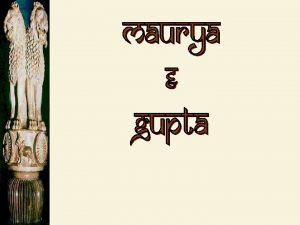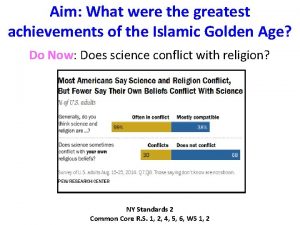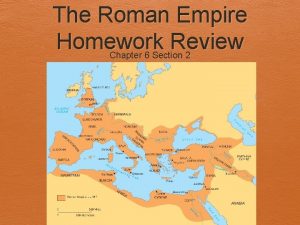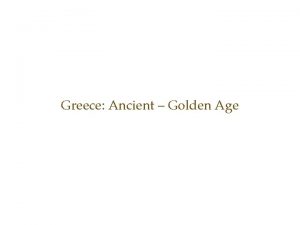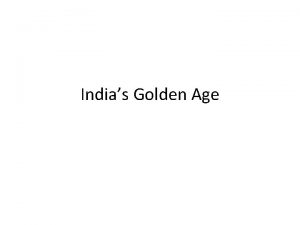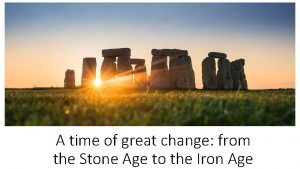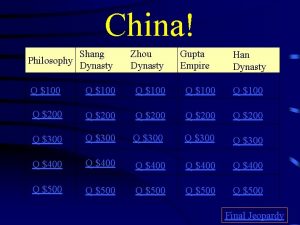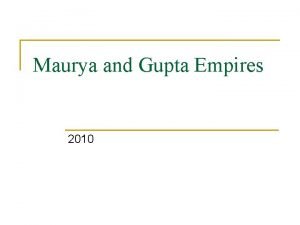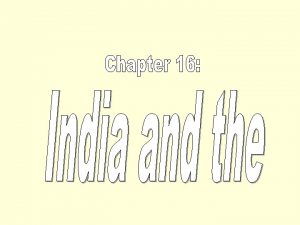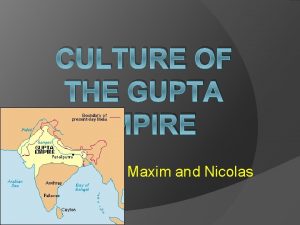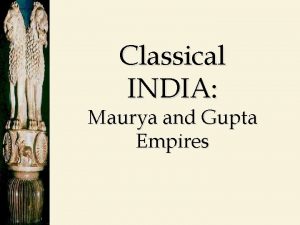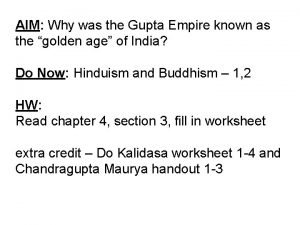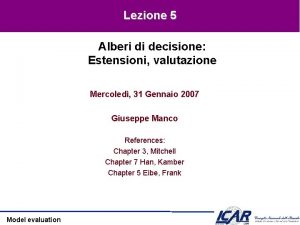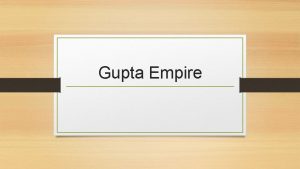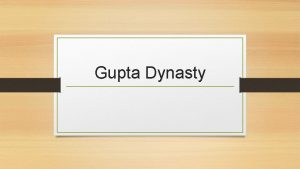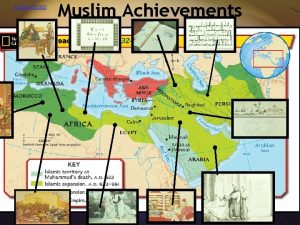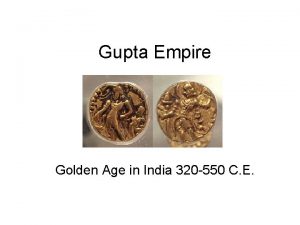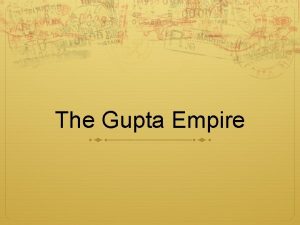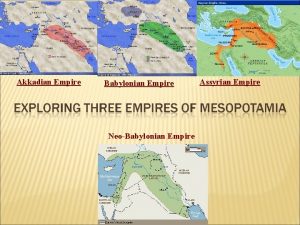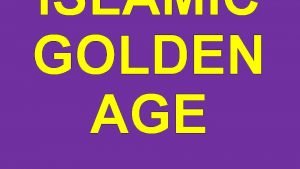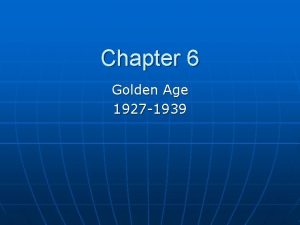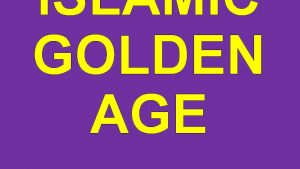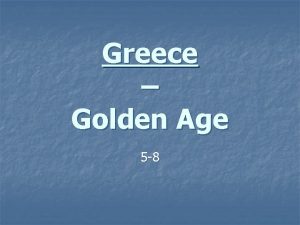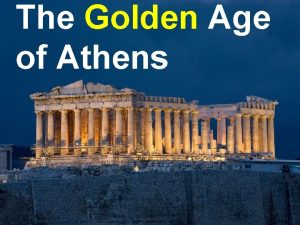Gupta Empire ACHIEVEMENTS Golden Age of India set


















- Slides: 18

Gupta Empire ACHIEVEMENTS : Golden Age of India – set up strong central government, trade and farming Mathematics: system of numerals, concept of zero, decimal system Medicine: treated illnesses and injuries with herbs and remedies, set broken bones, performed surgeries, and vaccinations

Tang Dynasty GOLDEN AGE of CHINA Land reform: gave land to the peasants Canals: helped in transportation of goods and people => increased trade Cultural Diffusion with Japanese: scholars and merchants brought writing and Buddhism to Japan Civil Service: adopted Confucianism – people received jobs based on merit Scholar Officials: intelligent officials made good, solid decisions benefitting the people Downfall: gov’t corruption, high taxes, drought and famine and rebellion

Song Dynasty Achievements: moveable type inc. printing & amount of books inc. Magnetic compass: helped in navigation & exploration – overseas trade & colonization Scholar officials: educated gov’t officials were held in very high regard Footbinding: women were crippled purposely = status symbol

Footbinding

Byzantine Empire Autocratic government • Justinian- Justinian’s Code – Refomred laws based on Roman Laws • Constantinople- Capital- was on a peninsula overlooking the Bosporus strait connecting the Black Sea to the Mediterranean Sea) • Influenced by Greco Romans- taught the “classics”

The Great Schism Roman Catholic -Priests can’t marry -Language=Latin -no use of icons. Holy images -Pope head of church Orthodox Christian Church - Priests can marry - Language is Greek - mosaics

Impact- Cultural Diffusion • Trade linked Russia and Eastern Europe -Cyrillic Alphabet -adopted religious themed art, music and architecture (Byzantine Domes transformed into onion domes of Russia -Orthodox Christianity

ISLAM • SPLIT- Who should succeed Muhammad • Sunnis- Don’t need to be a direct relative of Muhammad • Shiites- Need to be a direct relative of Muhammad • Spread through trade and conquest • Islamic Law- based on the Koran and Shariah (controlled everyday life)

Social Status • • • WOMEN “Righteous women are obedient” However, men and women are equal Shariah gave women some rights SLAVES Prisoners of war and or non-Muslims Performed housework and served in the military

GOLDEN AGE • Muslim scholars opened libraries and encouraged learning • Translations of ancient texts became important • Calligraphy • Astronomy • Medicine • Architecture

Medieval Europe • Manorialism- economic system based on self sufficient manor • Serf-peasant farmer bound to land • Excommunicate- remove someone from the Catholic Church • Feudalism- Social and Political system based on land ownership (land-labor-loyalty) • Fiefs- someone who receives land • Vassals- landowners

Pope Crowned Charlemagne Holy Roman Emperor: Dec. 25, 800 Modern day France, Germany, Italy

Feudalism • Nobles: landowners or high-ranking church officials • Vassals: lesser landowner Manorialism • Economic System based on mutual responsibility • Land ↔ labor, protection, loyalty • Everyone on manor contributes to the self- sufficiency of the manor

Medieval Church • Largest landowners- controlled Europe • Roman Catholic Church- most powerful • Unifying Force- feudalism broke people apart and Christianity brought them together • Architecture: Gothic- churches were made elaborately and as tall as possibleshowed power

Roles of Church • Economic: tithing (church tax) raised tremendous amounts of money • Political Power: had power of empires, collected taxes, formed armies, made treaties, and appointed and disposed of kings and princes • Learning: opened monasteries- educated and preached the word of God- advocated his beliefs • Jews persecuted

CRUSADES • Byzantine Emperor asked for help against the Muslims • Fought for control of Holy Land- Jerusalem • Salvation would be gained-promised a spot in Heaven if fought

CRUSADES- Cultural Diffusion • Trade- reintroduction of trade b/w Middle East and Europe; Europeans became interested in New Muslim and Eastern Goods • Learning- new ideas, people start questioning the church and experiment • Power of Rulers increase- church loses power and influence to local rulers • Relations- contact with Muslims & Chinese creates long-lasting tensions

CRUSADES- people • Urban II- Pope who called for Crusades • Saladin- Muslim ruler who helped the Muslims recapture the Holy land from the Christians • Richard the Lion Hearted- English King who went on Crusade and helped the Christians regain the Holy Land for only a brief period
 Venn diagram of mauryan and gupta empires
Venn diagram of mauryan and gupta empires Roman empire greatest achievements
Roman empire greatest achievements Golden age of the roman empire
Golden age of the roman empire Golden age of the roman empire
Golden age of the roman empire Persian empire golden age
Persian empire golden age India's golden age
India's golden age Stone age chronology
Stone age chronology Iron age bronze age stone age timeline
Iron age bronze age stone age timeline Gupta empire philosophy
Gupta empire philosophy 647 ce
647 ce Chandragupta maurya ruled for _____years.
Chandragupta maurya ruled for _____years. Gupta art
Gupta art Fall of gupta empire
Fall of gupta empire What is gupta empire known for
What is gupta empire known for Varna gupta
Varna gupta What was the main achievement of the maurya family
What was the main achievement of the maurya family Astronomy gupta empire
Astronomy gupta empire Total set awareness set consideration set
Total set awareness set consideration set Training set validation set test set
Training set validation set test set
